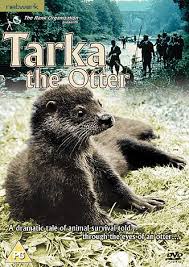
TARKA THE OTTER
UK, 1978, 87 minutes, Colour.
Peter Bennett, Edward Underdown, Brenda Cavendish, Reg Lye, narrator: Peter Ustinov.
Directed by David Cobham.
Tarka the Otter is based on a nature classic by Henry Williamson, published in 1927. The film version was written and directed by David Cobham in collaboration with naturalist author Gerald Durrell. The film is beautifully photographed and shows in detail the life and doings of otters. The setting is Devon and a canal and various bridges and the river going down to the sea. The animals, while personalised and having names, are not treated as characters acting out a story but rather are described by the continuous plain narrative spoken by Peter Ustinov. This has the advantage of not sentimentalising the animals and making us observe nature. However, it also has a somewhat distancing effect and the film often seems like a documentary. The film is attractive and informative for family audiences.
1. The entertaining and education value of this kind of story, send -documentary? For what audience was it made? How did it communicate its content - plot, information, emotional appreciation of the otter and its world?
2. The semi-documentary overtones - the value of having the narrative, as spoken by Peter Ustinov? Information, personalising the otter and its life? A detached and observer's view of the otter?
3. The qualities of the colour photography? Realism, observation of nature? The poetic presentation? Underwater photography? The importance of the editing for pace and presentation of nature? The location photography - Britain in 1927, ponds, rivers. the ocean? The contribution of the semi-classical type of score?
4. The importance of presenting the otter's life in a parallel way with that of humans? Audience interest, identification, sympathy? The otter as rodent and therefore repellent? The observation of the life of the otter and audience interest in this - struggles, survival, achievement? The tracing of the otter's life - the bitch otter being spared in the hunt because of her pregnancy, the birth of Tarka (the little water wanderer)? Tarka’s father being killed in the hunt, the mother's death from the farmer? Tarka and his birth place, the otter and their swimming down river to the Atlantic, the estuary, the encounter with the salmon fishermen, the rabbit hunters and the chase by the ferret? The encounter with the female otter White Tip? Rivalry? Tarka's returning home to the pond? The farmyard situation? Having to survive through winter? Tarka swimming up the Torridge River to its source? The reuniting with White Tip? Their home together at Canal Bridge? The bearing of the three cubs? The return of the hunting season? The previous hostilities with Deadlock? Tarka being given four minutes grace, the hounds chasing? Tarka’s refuge on the mill wheel. his being hounded, cut off. Deadlock and Tarka's duel under water? The death of Deadlock? The parallel with human situations?
5. How was Tarka presented as hero - character, the descriptions? His behaviour? White Tip as heroine? Deadlock as villain?
6. The importance of the humans - the salmon fishermen and their being bitten and their hostility towards otters, the hunters and the chase? Otters as animals to be hunted?
7. The background of nature - its beauty, perennial laws, the survival